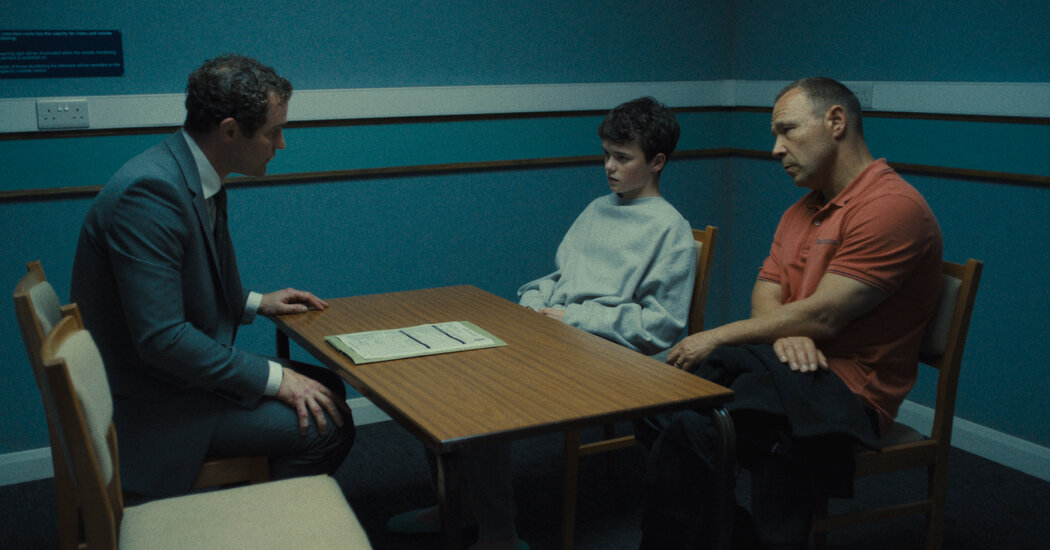“Stephen Graham and Owen Cooper’s candid conversation with the creative minds behind the Netflix hit series ‘Adolescence’ drops like a bombshell, shedding light on the complex world of adolescence and the masterminds pushing the boundaries of coming-of-age storytelling. As the trio delves into the world of 13-year-olds navigating love, family, and identity, they reveal intimate secrets, raw emotions, and unflinching honesty that have left a lasting impact on audiences worldwide. In our exclusive interview, we sit down with the talented duo to dissect the show’s impact, their personal experiences, and what they hope viewers take away from this captivating and unapologetic portrayal of adolescence.”
The Actors’ Dynamic: A Key Factor in the Show’s Success

The on-screen bond between Owen Cooper and Stephen Graham has been highlighted as a crucial element in the success of “Adolescence”. In a recent video interview, the two actors showcased their natural chemistry, with Graham displaying a paternal concern for Cooper’s well-being. This dynamic has been praised by critics and has undoubtedly contributed to the show’s widespread popularity.
Social Media, Smartphones, and the Government’s Response
The Show’s Influence on British Politics: Calls for Social Media Ban and Restricted Access
The Netflix hit has sparked intense debate about the role of social media and smartphones in the lives of children. In Britain, the show has reignited calls for a social media ban and restricted access to smartphones in schools. Campaigners for a phone ban in schools have reported a surge in support, with many citing the show as a prime example of the dangers of unrestricted online access.
The Government’s Stance: Prime Minister Keir Starmer’s Comments on “Adolescence”
Last week, Prime Minister Keir Starmer told the House of Commons that he was watching “Adolescence” with his two children, and emphasized the need for action to address the “fatal consequences” of young men and boys viewing harmful content online. This statement has been seen as a significant indicator of the government’s growing concern about the impact of social media on children.
Implications for Parents and Schools: The Debate on Smartphone Use by Children
The show has raised important questions about the responsibility of parents and schools in regulating children’s access to smartphones and social media. As the debate continues, experts are urging parents and educators to take a more proactive role in monitoring and guiding children’s online activities. With the show’s influence, the stakes have never been higher, and the outcome of this debate will have far-reaching consequences for generations to come.
The Creators’ Vision: Jack Thorne and Stephen Graham’s Goal
Thorne’s Aim: Sparking Political Debate through TV Dramas
Jack Thorne, the British screenwriter and playwright, has long sought to stir political debate through his TV dramas. With “Adolescence”, he has finally achieved his goal, sparking a nationwide conversation about the impact of social media on children. Thorne’s vision is clear: to use television as a catalyst for change, and to challenge audiences to confront the darker aspects of modern life.
The Show’s Themes: Exploring the Consequences of Online Content
“Adolescence” explores the devastating consequences of online content, particularly misogynistic ideas, on vulnerable young minds. By delving into the complexities of this issue, the show raises important questions about the responsibility of social media platforms and the role of parents and educators in guiding children’s online activities.
The Writers’ Intentions: Raising Awareness and Driving Change
Thorne and Graham’s ultimate goal is to raise awareness about the dangers of unrestricted online access and to drive change in the way we approach social media and smartphones. By sparking a national conversation, they hope to inspire policymakers, parents, and educators to take action and create a safer online environment for children. As the show’s popularity continues to soar, it is clear that their vision is fast becoming a reality.
Conclusion
In conclusion, the recent interview between Stephen Graham and Owen Cooper, the creative minds behind the Netflix hit ‘Adolescence’, offers a poignant exploration of the complexities of growing up and the struggles that define this pivotal stage of life. Through their thought-provoking discussion, Graham and Cooper shed light on the inspiration behind their film, drawing from their own experiences of adolescence and the societal pressures that shape our formative years. They delve into the themes of identity, peer pressure, and the fragility of youth, highlighting the importance of empathy and understanding in navigating these tumultuous years.
The significance of ‘Adolescence’ lies not only in its unflinching portrayal of teenage life but also in its ability to spark crucial conversations about the support systems and resources needed to guide young people through this critical phase. As Cooper aptly puts it, “we’re all still trying to figure out who we are,” and it is this universal struggle that makes ‘Adolescence’ a relatable and impactful watch. As we look to the future, it is essential that we continue to prioritize the well-being and mental health of our youth, fostering environments that encourage open dialogue and genuine connection.
As we reflect on the profound insights shared by Graham and Cooper, we are reminded that adolescence is not just a stage of life, but a state of mind – one marked by uncertainty, self-discovery, and the unrelenting pursuit of identity. It is our responsibility to create a world where young people can thrive, free from the suffocating grip of societal expectations and the crushing weight of anxiety. As we move forward, let us carry the lessons of ‘Adolescence’ with us, striving to build a future where every individual can grow, learn, and flourish without apology – for it is in embracing our vulnerabilities that we truly come of age.
